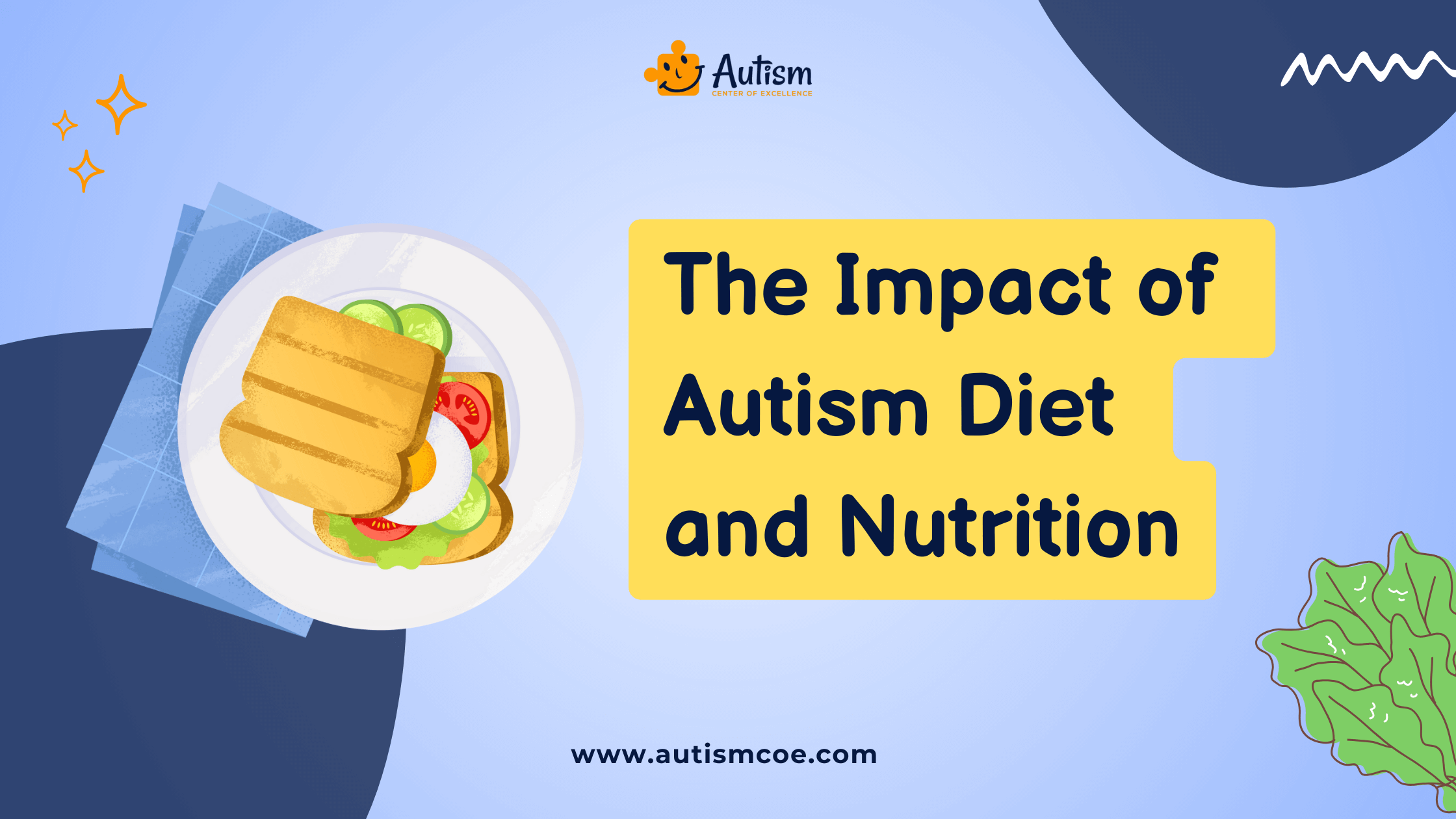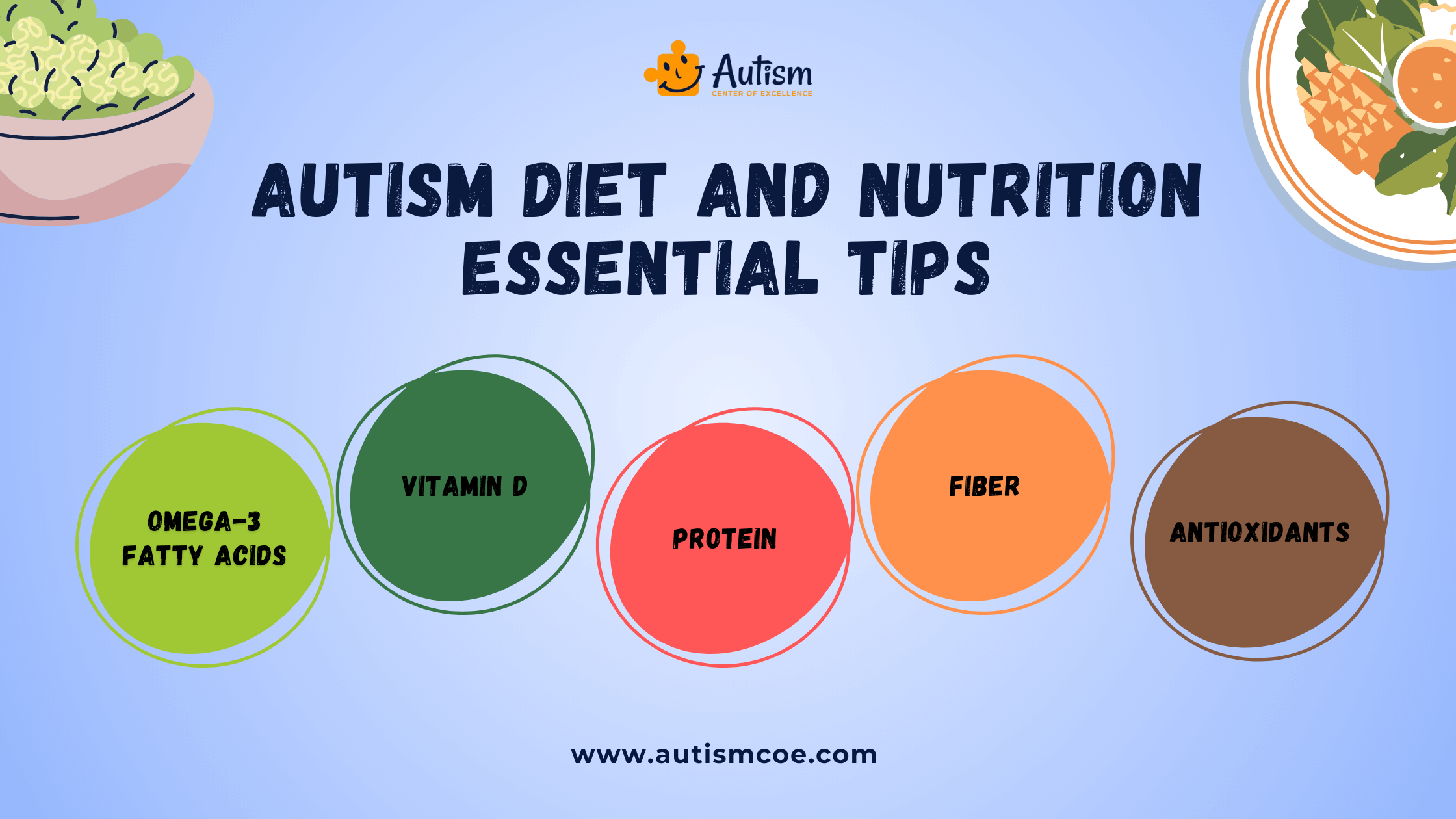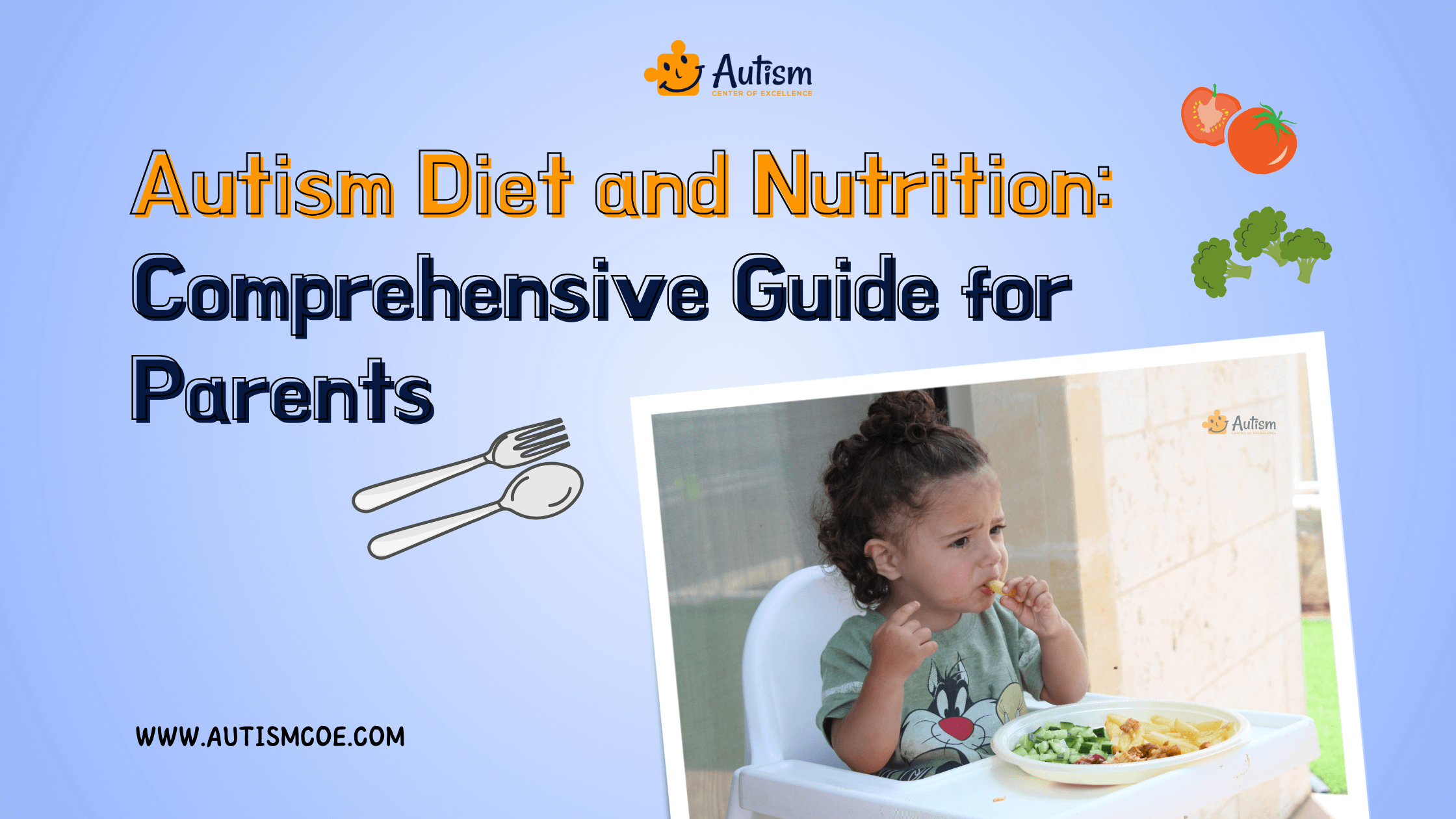Diet plays a significant role in managing Autism symptoms and promoting overall health in children on the autism spectrum. While Autism Spectrum Disorder (ASD) is primarily a neurodevelopmental condition, emerging research suggests that dietary interventions can have a profound impact on the behavioral and cognitive aspects of Autism. As parents, it’s essential to understand this connection and explore how nutrition can support your child’s well-being.
Proper nutrition is crucial for all children, but it holds particular significance for those with Autism. Many children with ASD may have dietary sensitivities, gastrointestinal issues, or nutrient deficiencies that can exacerbate their symptoms. Additionally, some research suggests that certain dietary factors may influence behavior, mood, and cognitive function in children with Autism.

The Impact of Autism Diet and Nutrition
When it comes to managing Autism Spectrum Disorder (ASD), diet and nutrition play a crucial role in supporting overall health and well-being. As a parent of a child with Autism, understanding the impact of diet on their condition is essential. Here’s what you need to know:
Dietary Influences on Autism Symptoms:
Research suggests that certain dietary factors may influence Autism symptoms. Some children with ASD may have sensitivities or intolerances to specific foods, while others may benefit from nutritional interventions that support brain function and behavior.
Common Dietary Interventions:
Several dietary interventions are commonly used in the management of Autism. These include gluten-free, casein-free, and ketogenic diets. While the effectiveness of these interventions varies from child to child, many parents report improvements in behavior, communication, and digestive issues after implementing dietary changes.
Nutritional Considerations:
Ensuring that your child with Autism receives adequate nutrition is paramount. Some children with ASD may have selective eating habits or aversions to certain foods, making it challenging to meet their nutritional needs. Incorporating nutrient-dense foods such as fruits, vegetables, lean proteins, and whole grains into their diet can help provide essential vitamins and minerals.
Consultation and Support:
Consulting with healthcare professionals, such as pediatricians, dietitians, or nutritionists, can provide valuable guidance and support in navigating dietary concerns related to Autism. These professionals can help develop personalized nutrition plans tailored to your child’s specific needs and preferences.
By being proactive and informed about the impact of diet on Autism, parents can play a vital role in supporting their child’s health and well-being. Stay tuned for more in-depth insights and practical tips on how to optimize your child’s diet for better outcomes in managing Autism Spectrum Disorder.
Understanding Dietary Interventions
In the realm of Autism treatment, dietary interventions have garnered attention as potential strategies to manage symptoms and improve the overall well-being of children on the spectrum. Among the various dietary approaches, three commonly discussed options include gluten-free, casein-free, and ketogenic diets. Let’s delve into each of these interventions to understand their potential impact on individuals with Autism.
Gluten is a protein found in wheat, barley, and rye. Some children with Autism may have sensitivities or allergies to gluten, leading to digestive issues, behavioral changes, and other symptoms. A gluten-free diet involves eliminating gluten-containing foods and replacing them with gluten-free alternatives like rice, quinoa, and corn. While research on the effectiveness of gluten-free diets in improving Autism symptoms is mixed, some parents report positive outcomes, such as reduced hyperactivity and improved focus.
Casein is a protein found in dairy products like milk, cheese, and yogurt. Similar to gluten, some children with Autism may be sensitive to casein, experiencing digestive discomfort, irritability, or other symptoms after consuming dairy. A casein-free diet involves avoiding dairy products and opting for dairy alternatives like almond milk, coconut milk, or soy products. While scientific evidence supporting the use of casein-free diets in autism treatment is limited, some parents observe improvements in behavior and communication skills after removing dairy from their child’s diet.
The ketogenic diet is a high-fat, moderate-protein, and low-carbohydrate eating plan that aims to induce a state of ketosis, where the body burns fat for fuel instead of carbohydrates. While originally developed to treat epilepsy, some studies suggest that the ketogenic diet may benefit individuals with autism by reducing seizures, improving cognition, and regulating mood and behavior. However, implementing and adhering to a ketogenic diet can be challenging and may require careful monitoring and supervision by healthcare professionals.
Dietary interventions like gluten-free, casein-free, and ketogenic diets are among the approaches parents may consider when exploring options to support their child with autism. While these diets hold promise for some individuals, it’s essential to approach them with caution and consult healthcare professionals before making significant dietary changes. Additionally, every child with autism is unique, and what works for one may not work for another. By staying informed and working closely with healthcare providers, parents can make informed decisions about nutrition and its potential impact on their child’s well-being.

Autism Diet and Nutrition Essential Tips
Ensuring that children with Autism receive adequate nutrition is crucial for supporting their overall health and well-being. Here’s a comprehensive guide to essential nutrients and vitamins for children with autism, along with tips for incorporating them into their diet:
1️⃣ Omega-3 Fatty Acids:
Omega-3 fatty acids, found in fatty fish like salmon, walnuts, and flaxseeds, are essential for brain health and cognitive function. Including sources of omega-3s in your child’s diet can support their neurological development and may help improve behavior and attention.
2️⃣ Vitamin D:
Vitamin D plays a vital role in immune function, bone health, and mood regulation. Children with Autism may have lower levels of vitamin D due to limited sun exposure or dietary factors. Incorporating vitamin D-rich foods such as fortified dairy products, eggs, and oily fish can help maintain optimal levels.
3️⃣ Protein:
Protein is essential for growth, muscle development, and neurotransmitter function. Including lean sources of protein such as poultry, beans, lentils, and tofu in your child’s diet can provide the amino acids needed for optimal health and development.
4️⃣ Fiber:
Fiber is important for digestive health and regulating blood sugar levels. Encouraging your child to consume fiber-rich foods like fruits, vegetables, whole grains, and legumes can support regular bowel movements and overall gut health.
5️⃣ Antioxidants:
Antioxidants help protect cells from damage and inflammation. Colorful fruits and vegetables such as berries, spinach, kale, and carrots are rich in antioxidants like vitamin C, vitamin E, and beta-carotene. Including a variety of antioxidant-rich foods in your child’s diet can support their immune system and overall well-being.
Tips for Incorporating Essential Nutrients:
✔️ Offer a variety of nutrient-dense foods at meals and snacks to ensure your child receives a balanced diet.
✔️ Get creative with food presentation by incorporating fruits and vegetables into smoothies, soups, and casseroles.
✔️ Involve your child in meal planning and preparation to increase their engagement and willingness to try new foods.
✔️ Consider supplementation under the guidance of a healthcare professional if dietary intake of certain nutrients is inadequate.
By prioritizing essential nutrients and vitamins in your child’s diet, you can support their health and development while managing symptoms associated with Autism Spectrum Disorder. Experiment with different foods and recipes to find what works best for your child, and don’t hesitate to seek guidance from a registered dietitian or nutritionist for personalized dietary recommendations.
Join Our Weekly Newsletters!
Subscribe now to stay updated with our latest email updates.
Meal Planning Tips for Children with ASD
Meal planning for children with Autism Spectrum Disorder (ASD) requires thoughtful consideration of their unique dietary needs and preferences. Here’s a comprehensive guide to help parents navigate meal planning and discover delicious recipes tailored to support their child’s health and well-being:
✅ Establish a Routine:
Consistency is key when it comes to mealtime for children with ASD. Establishing a predictable meal schedule can help create a sense of stability and reduce anxiety around food. Aim for three balanced meals and 1-2 snacks per day, spaced evenly throughout the day.
✅ Focus on Whole Foods:
Opt for nutrient-dense, whole foods to provide essential vitamins, minerals, and antioxidants. Incorporate a variety of fruits, vegetables, lean proteins, whole grains, and healthy fats into your child’s diet. Minimize processed foods, sugary snacks, and artificial ingredients whenever possible.
✅ Accommodate Preferences and Sensory Sensitivities:
Children with ASD may have specific food preferences and sensory sensitivities that impact their eating habits. Pay attention to textures, flavors, and presentation when planning meals. Offer a variety of options and respect your child’s preferences while gently introducing new foods over time.
✅ Get Creative with Recipes:
Experiment with creative and kid-friendly recipes that cater to your child’s dietary needs. Consider making homemade versions of favorite foods using wholesome ingredients. Get your child involved in meal preparation to increase their engagement and encourage a positive relationship with food.
✅ Consider Special Diets:
Some children with ASD may benefit from specialized diets such as gluten-free, casein-free, or ketogenic diets. Consult with a healthcare professional or registered dietitian to determine if a specific dietary intervention is appropriate for your child and to receive guidance on implementation.
Remember to prioritize variety, balance, and flexibility in your child’s meal plan. Focus on creating a positive and enjoyable eating environment, and celebrate small victories along the way. With patience, creativity, and a supportive approach, you can help your child with ASD develop healthy eating habits and thrive.
Frequently Asked Questions & Answer
What is an Autism Diet?
An Autism diet typically refers to dietary interventions or modifications aimed at managing symptoms associated with Autism Spectrum Disorder (ASD). These interventions may involve eliminating certain foods or food groups, focusing on nutrient-dense foods, or incorporating supplements to address specific nutritional needs.
Should Autistic Children Be on a Special Diet?
Whether autistic children should be on a special diet depends on individual circumstances. Some parents and healthcare professionals believe that certain dietary interventions, such as gluten-free or casein-free diets, may help alleviate autism symptoms in some children. However, the effectiveness of these diets varies from child to child, and they should be implemented under the guidance of a healthcare professional.
How Does Diet Affect Children’s Health and Wellbeing?
Diet can significantly impact children’s health and wellbeing, including those with Autism. A well-balanced diet rich in essential nutrients supports overall physical health, cognitive function, and emotional wellbeing. For children with Autism, certain dietary modifications may help manage gastrointestinal issues, improve behavior, and enhance overall quality of life.
What Type of Diet is Best for Someone With Autism?
The best diet for someone with Autism depends on their individual needs, preferences, and any underlying health conditions. While there is no one-size-fits-all approach, focusing on nutrient-dense foods, minimizing processed foods and sugars, and ensuring adequate intake of essential nutrients like omega-3 fatty acids, vitamins, and minerals can support optimal health. Some individuals with autism may benefit from specialized diets such as gluten-free, casein-free, or ketogenic diets, but these should be implemented with caution and under the guidance of a healthcare professional.
Conclusion
In conclusion, diet and nutrition play a vital role in managing Autism Spectrum Disorder (ASD) and supporting a child’s overall health. Prioritize nutrient-dense foods, including a variety of fruits, vegetables, lean proteins, whole grains, and healthy fats, to ensure they receive essential vitamins and minerals. Establishing a consistent meal schedule and involving your child in meal preparation can foster a positive relationship with food.
Explore specialized diets like gluten-free, casein-free, or ketogenic diets under professional guidance, as they may offer benefits for some children with ASD. Seek support from healthcare professionals, registered dietitians, and autism-specific support groups to navigate the complexities of managing your child’s diet and nutrition. The Autism Center of Excellence can provide additional support and resources tailored to your child’s needs. AutismCOE provides ABA Therapy, ABA for Early Intervention, ABA for School Readiness, Speech Therapy, and Occupational Therapy services for children aged 2 – 14 years in-home as well as in center-based environments.
Remember, every child with Autism is unique, so tailor your approach to meet their individual needs. By focusing on a balanced diet, creating a positive eating environment, and seeking help when necessary, parents can empower their child with Autism to thrive and reach their full potential.
Please Note: The content of this blog is for informational purposes only and should not be considered a substitute for professional medical advice, diagnosis, or treatment. Consult a qualified health care professional for personalized guidance tailored to your specific situation.

Bhavika Bhasin
Bhavika Bhasin is the Research and Marketing officer at AutismCOE. She works with children and adults with ASD. Her clinical research includes evaluating various available autism screening and diagnosis methods and their efficacy. She is currently developing a novel screening exam that is indicated to be more accurate than the existing available exams. She is also writes articles papers for various publications.


